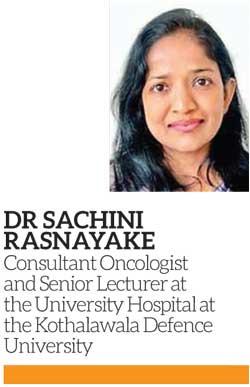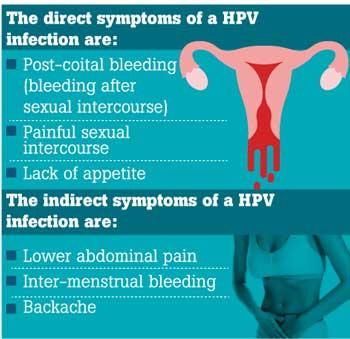11 Dec 2020 - {{hitsCtrl.values.hits}}
 According to the WHO, cancer is the second leading cause of death. But, did you know that you can prevent a certain cancer by just a vaccine? Most types of cervical cancers can be prevented by the HPV vaccine. Though it is mostly 100% preventable, cervical cancer is the third most common cancer in Sri Lanka. WHO states that in 2018, an estimated 570 000 women were diagnosed with the disease globally while 311 000 women died of it. According to Dr Sachini Rasnayake, Senior Lecturer at the University Hospital at the Kothalawala Defence University and Consultant Oncologist, cervical cancer used to be the second or third most common cancer in developed countries few decades ago. “But now, with mandatory national screening for all females of the age of 21 and above, the incidence of cervical cancer has decreased in those countries,” Dr. Rasnayake revealed.
According to the WHO, cancer is the second leading cause of death. But, did you know that you can prevent a certain cancer by just a vaccine? Most types of cervical cancers can be prevented by the HPV vaccine. Though it is mostly 100% preventable, cervical cancer is the third most common cancer in Sri Lanka. WHO states that in 2018, an estimated 570 000 women were diagnosed with the disease globally while 311 000 women died of it. According to Dr Sachini Rasnayake, Senior Lecturer at the University Hospital at the Kothalawala Defence University and Consultant Oncologist, cervical cancer used to be the second or third most common cancer in developed countries few decades ago. “But now, with mandatory national screening for all females of the age of 21 and above, the incidence of cervical cancer has decreased in those countries,” Dr. Rasnayake revealed.
Causative factor 
The Human Papillomavirus (HPV), transmitted by sexual contact, is the causative factor for cervical cancer. “The destruction caused to the cells in the cervix by HPV gradually leads to abnormal and uncontrollable unwanted cell growth. This eventually leads to the formation of cancer in the cervix,” stated Dr. Rasnayake.
However, the changes do not happen overnight. The changes occur over a period of 5- 20 years. “In some cases, the early sign of infection can be detected in three years,” she said. Detection of abnormal changes in the cervical tissue during screening can help detect the early signs of the HPV infection.
“The most common and widely used method to screen is the pap smear test, which is not a painful procedure. With early detection of the infection, it can be prevented from growing into a cancer,” she shared, emphasizing on why it was crucial to have a national wide screening program for cervical cancer. “Currently, it is an opportunistic screening program in Sri Lanka, but since there is a lack of awareness of this cancer, many women don’t screen themselves,” the doctor added. She also stated that a HPV blood test was also available for detection of HPV.
Prevention 
“The HPV Vaccine can prevent a person from contracting HPV,” said Dr Rasnayake. The HPV vaccine was introduced to the National Immunization Programme in 2017. Currently, females are vaccinated against HPV at the age of 11. “While this is an excellent move by the Government, the majority of today’s youth are not vaccinated against HPV as it was introduced to the national programme recently. Therefore, I request all the youth to especially between ages of 11- 21 to get vaccinated against the HPV. This should be done before your first sexual relationship,” Dr Rasnayake pointed out, stating that even though males aren’t vaccinated against HPV currently, it was important they get vaccinated too. “HPV can cause viral warts and even penile cancers in men.”
While the vaccine remains as the foremost prevention against HPV and getting cervical cancer; usage of barrier protection methods during sexual contact, knowing about partner’s sexual history and whether they are infected with HPV, not having multiple sexual partners and routine screening can prevent the contraction of the virus and development of cervical cancer.
Dr. Rasnayake also noted that the vaccine only prevented one from contracting certain strains of the HPV virus, which most commonly cause cervical cancer. “It is best to routinely screen for cervical cancer. For those who have been vaccinated, the screening frequency would be less,” she shared.
Dr Rasnayake noted that sometimes up to stage 3 of cervical cancer, there can be no pain or symptoms.
Treatment
“Treatment for cervical cancer depends on the stage of the cancer. If it is at stage 1 and sometimes, stage 2- it is 100% curable. Stage 3- it might be curable however at stage 4, we can only control the disease progression and provide palliative care,” she said.
Since stage 1 of cervical cancer only includes a small abnormal growth in cells within the cervix, the surgery would require removing the cancerous cells with a margin. “Girls usually worry if they are able to bear children after undergoing surgery. At early stages, as long as the cancer has not spread to the uterus, we are able to remove the cancerous cells with adequate margins and keep the uterus intact. Therefore, girls are able to bear children and won’t have fertility issues,” she shared.
In stage 2, even though the growth is limited to the cervix, depending on the intensity of the cancerous growth; removal of uterus, high radiotherapy and concurrent chemoradiotherapy would be done. If the cancer has spread to the adjacent uterus and vagina, the cancer is said to be in stage 3. At this stage, surgery, radiotherapy and chemotherapy are done.
Stage 4 would mean that the cancer growth is beyond the pelvic region. “At this stage, the treatment depends on the kidney and renal function as chemotherapy needs proper kidney function to be effective,” revealed
Dr. Rasnayake.
“This is a cancer that is 100% preventable and completely curable at the early stages,” she said, advising that women above the age of 21 should screen themselves routinely every 3- 5 years. “The National Cancer Control Programme has a special screening clinic at Narahenpita,” she added.
21 Dec 2024 4 hours ago
21 Dec 2024 5 hours ago
21 Dec 2024 8 hours ago
21 Dec 2024 8 hours ago
21 Dec 2024 9 hours ago